What’s the matter
Unit1 What's the matter 短语总结-背诵版

Unit1What's the matter?短语总结—背诵版一、短语总结1.“(某人)怎么了?”表达(3+2+1+1)1.What’s the matter/trouble/problems(with sb.)?2.What’s wrong/up(with sb.)?3.(Is there)anything wrong(with sb.)?4.What happened to sb.?2.happen(意外地)发生(happen-happened-happened)1.take place(有计划地)发生2.take one’s place=take the place of sb.取代/代替某人的位置3.sth.happen(ed)to sb.某事发生在某人身上4.sb.happen(ed)to do sth.某人碰巧做某事3.“身体部位疼痛or不舒服”的表达(4)1.have a+疾病名词(headache/stomachache/toothache/其他疾病)2.have a sore+身体部位3.身体部位+hurt(s)4.have a pain in the+身体部位4.accident1.accidental adj.意外的accidentally adv.意外地2.by accident=accidentally意外地3.by mistake错误地5.lie1.lie in位于......(内部)2.lie to位于......(相隔海/省)3.lie on位于......(接壤)4.Iie ylie躺;位于lie-lay-lain lying lie down躺下lie on/in/to位于撒谎lie-lied-lied lie to sb.对某人撒谎lie about sth.对某事撒谎lay放置;下蛋lay-laid-laid laying lay down放下6.上下车1.get on/off+a/the bus/plane/train/metro/subway2.get in/into/out of+a/the taxi/car/van7.think v.思考;认为(think-thought-thought)1.think about思考;考虑2.think over=think about carefully仔细考虑3.think of认为;想起What do you think of...?=How do you like...?你认为...怎么样?4.think twice再三考虑;谨慎考虑8.surprise n./v.(surprise-surprised-surprised)1.to one’s surprise令某人吃惊的是2.in surprise=surprisingly吃惊地3.be surprised at对......感到吃惊4.be excited about对......感到激动5.be interested in对......感兴趣9.trouble n.麻烦(不可数)1.have trouble/problems/difficulty(in)doing sth.做某事有麻烦/问题/困难2.get into trouble陷入麻烦3.be in trouble在麻烦中10.fall v./n.(秋天)(fall-fell-fallen)1.fall behind sb.落后某人catch up with sb.赶上某人2.fall in love with sb./sth.爱上...../与......相爱3.fall down掉下4.fall over摔跤5.fall down from...=fall off...从......掉下6.fall asleep睡着11.run v.跑/经营(run-ran-run)1.run after...追赶...2.run away逃跑3.sb.run out of sth.某人用光/耗尽某物4.sth.run out某物花光/耗光5.run a shop/company/restaurant经营一家商店/公司/餐馆e n./v.使用(use-used-used)1.be useful=be of use有用的2.be useless=be of no use没有用的3.be used to(doing)sth.习惯于(做)某事4.be used to do sth.被用来做某事ed to do sth.过去常常做某事13.help n./v.帮助(help-helped-helped)1.help(sb.)to do sth.帮助某人做某事2.help sb.with sth.在某方面帮助某人3.can’t help doing sth.情不自禁/忍不住做某事4.help oneself to sth.自便/自取......(随便吃/喝......)5.with one’s help=with the help of sth.在某人的帮助下6.ask sb.for help=turn to sb.向某人寻求帮助14.own adj.自己的v.拥有(own-owned-owned)owner n.拥有者1.sb.own sth.=sb.be the owner of sth.某人拥有某物2.on one’s own=by oneself=alone独自地3.one’s own+n.(单/复)某人自己的......15.mean v.意思是/打算(mean-meant-meant)adj.刻薄的;吝啬的meaning n.意思;意义meaningful adj.有意义的meaningless无意义的1.mean to do sth.打算做某事2.mean doing sth.意味着做某事16.mind v.介意/在意(mind-minded-minded)n.决心;心智;思想;头脑1.make up one’s mind(to do sth.)下定决心(做某事)2.change one’s mind改变某人的主意3.keep......in mind记住......4.lose one’s mind失去理智;发疯5.in one’s mind=in one’s opinion=in one’s view在某人看来6.mind sb./one’s doing sth.介意某人做某事7.Never mind.(用于安慰)没关系;别担心;不要紧17.cut v.切割/砍(cut-cut-cut)1.cut up=cut...into pieces切碎2.cut off切掉3.cut down砍倒4.cut...in half对半切开18.keep v.保持;继续(keep-kept-kept)1.keep doing sth.保持做某事2.keep sb.doing sth.让某人保持做某事3.keep on doing sth.=go on doing sth.继续做某事4.keep/stop sb.from doing sth.阻止某人做某事19.risk(risk-risked-risked)1.be at risk=be in danger有危险的/在危险中2.take a risk=take risks冒险3.take the risk of sth.=be at the risk of sth.冒着......的风险4.risk doing sth.冒险做某事20.expect v.期待(expect-expected-expected)1.expect(sb.)to do sth.期待(某人)做某事2.expect that从句期待+宾语从句21.sick adj.生病的(定语、表语)ill adj.生病的(只作表语)1.sick-sicker-sickest ill-worse-worst2.be sick of sth.厌烦某事3.be tired of sth.厌倦某事22.breath n.呼吸breathe v.呼吸(breathe-breathed-breathed)1.breathe fresh air呼吸新鲜空气2.hold one’s breath屏住呼吸3.take a deep breath深呼吸4.be out of breath上气不接下气23.ready adj.准备好的1.get/be ready to do sth.准备好做某事2.get/be ready for sth.为......做好准备24.其他短语1.be in control of sth.控制/掌管/管理某事2.take one’s temperature量某人的体温3.take the medicine吃药take pills吃药片4.the rest of sth./sb.剩下的某物/某人5.right away=right now=at once立刻;立即;马上6.get out of...从......出来/离开......。
人教版unit1 What's the matter 知识点

在这里cold是名词,因此前边可以加冠词“a”。
3.never是否定词,因此我们用any,不用some
I never have any fun .我从没什么乐趣。
4.What’s the matter with you ?你怎么了?
with是个介词,后边可以跟名词或代词。
I--myself you--yourself/yourselves he-himself we--ourselvesthey-themselves
23.bandage n.细带v.用绷带包扎
24.press v.压;挤;按三单presses--现在分词pressing--过去式pressed
25.sick adj.生病的;有病的
Unit 1What’s the matter知识点
一.主要单词
1.matter n.问题;事情What's the matter怎么了?出什么事了?
v要紧It doesn't matter。
2.sore①adj.疼痛的;酸痛的比较级sore最高级sorest
②n.疮,痛处复数sores
3.stomachachen.胃痛;腹痛疼痛部位+ache:toothache牙疼
34.get hit on the head打了头
35.get hit by a ball被球打了头
36.get sunburned晒伤
三.语法
1.情态动词should的用法
意为“应该”,常用“should do sth.”或“shouldn't do sth.”。
should比must和ought to语气更加委婉。
英语《What's the matter》基础知识PPT公开课件
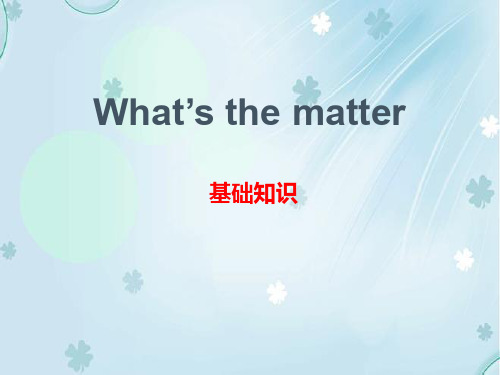
: 其实兴趣真的那么重要吗?很多事情我 们提不 起兴趣 可能就 是运维 我们没 有做好 。想想 看,如 果一件 事情你 能做好 ,至少 做到比 大多数 人好, 你可能 没有办 法岁那 件事情 没有兴 趣。再 想想看 ,一个 刚来到 人世的 小孩, 白纸一 张,开 始什么 都不会 ,当然 对事情 开始的 时候也 没有 兴趣这 一说了 ,随着 年龄的 增长, 慢慢的 开始做 一些事 情,也 逐渐开 始对一 些事情 有兴趣 。通过 观察小 孩的兴 趣,我 们可以 发现一 个规律 ,往往 不是有 了兴趣 才能做 好,而 是做好 了才有 了兴趣 。人们 总是搞 错顺序 ,并对 错误豪 布知晓 。尽管 并不绝 对是这 样,但 大多数 事情都 需要熟 能生巧 。做得 多了, 自然就 擅长了 ;擅长 了,就 自然比 别人做 得好; 做得比 别人好 ,兴趣 就大起 来,而 后就更 喜欢做 ,更擅 长,更 。。更 良性循 环。教 育小孩 也是如 此,并 不是说 买来一 架钢琴 ,或者 买本书 给孩子 就可以 。事实 上,要 花更多 的时间 根据孩 子的情 况,选 出孩子 最可能 比别人 做得好 的事情 ,然后 挤破脑 袋想出 来怎样 能让孩 子学会 并做到 很好, 比一般 人更好 ,做到 比谁都 好,然 后兴趣 就自然 出现了 。
凡事 都 是 多 棱 镜, 不 同 的 角度 会 看 到不 同 的 结 果。 若 能 把 一些 事 看 淡 了, 就 会 有 个好 心 境 ,若 把 很 多 事看 开 了 , 就会 有 个 好 心 情。 让 聚 散 离合 犹 如 月缺 月 圆 那 样寻 常 , 让 得失 利 弊 犹 如花 开 花 谢 那样 自 然 ,不 计 较 , 也不 刻 意 执 着; 让 生 命 中 各种 的 喜 怒 哀乐 , 就 像风 儿 一 样, 来 了 ,不 管 是 清风 拂 面 ,还 是 寒 风凛 冽 , 都报 以 自 然的 微 笑 ,坦 然 的 接受 命 运的 馈 赠 ,把 是 非 曲折 , 都 当作 是
初中英语语法课件 What’s the matter?

Do you have a fever? Yes, I do. / No, I don’t. / I don’t know.
Does he have a toothache? Yes, he does. He should see a dentist and get an X-ray.
What should se.
What’s the matter with him? Does he have a fever? Does he have a toothache? Does he have a sore throat? Does he have a backache? What should he do?
What’s the matter with him? Does he have a fever? Does he have a toothache? Does he have a sore throat? Does he have a stomachache? What should he do?
初中英语语法 What’s the matter?
当我们询问某人患了什么疾病或者遇到什么麻 烦事,通常有以下的几种表达方式 What’s the matter with sb.某人怎么了? What’s wrong with sb.某人怎么了? What’s the trouble with sb.某人出什么事儿了? What happened to sb, 某人发生了什么事?
Should I put some medicine on it? Yes, you should. No, you shouldn’t.
What’s the matter? I have a stomachache. You shouldn’t eat so much next time.
unit1What's -the-matter-知识点及短语
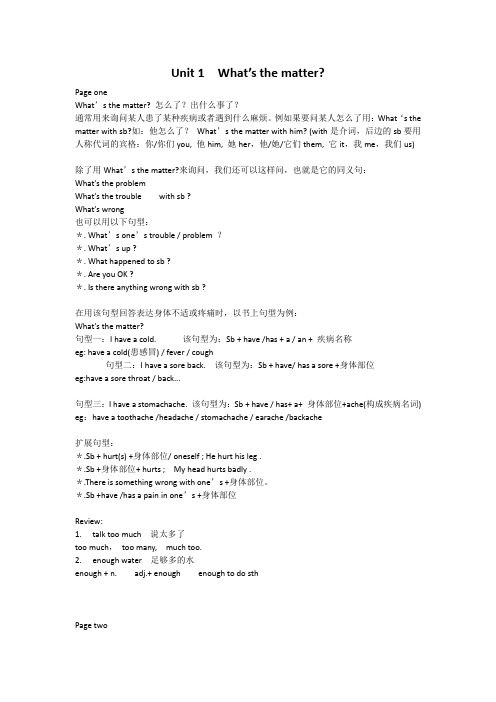
Unit 1 What’s the matter?Page oneWhat’s the matter? 怎么了?出什么事了?通常用来询问某人患了某种疾病或者遇到什么麻烦。
例如果要问某人怎么了用:What‘s the matter with sb?如:他怎么了?What’s the matter with him? (with是介词,后边的sb要用人称代词的宾格:你/你们you, 他him, 她her,他/她/它们them, 它it,我me,我们us)除了用What’s the matter?来询问,我们还可以这样问,也就是它的同义句:What’s the problemWhat’s the trouble with sb ?What’s wrong也可以用以下句型:*. What’s one’s trouble / problem ?*. What’s up ?*. What happened to sb ?*. Are you OK ?*. Is there anything wrong with sb ?在用该句型回答表达身体不适或疼痛时,以书上句型为例:What’s the matter?句型一:I have a cold. 该句型为:Sb + have /has + a / an + 疾病名称eg: have a cold(患感冒) / fever / cough句型二:I have a sore back. 该句型为:Sb + have/ has a sore +身体部位eg:have a sore throat / back...句型三:I have a stomachache. 该句型为:Sb + have / has+ a+ 身体部位+ache(构成疾病名词) eg:have a toothache /headache / stomachache / earache /backache扩展句型:*.Sb + hurt(s) +身体部位/ oneself ; He hurt his leg .*.Sb +身体部位+ hurts ; My head hurts badly .*.There is something wrong with one’s +身体部位。
八年级英语下册 Unit 1 What’s the matter知识点总结、作文 (新版)人教新目标
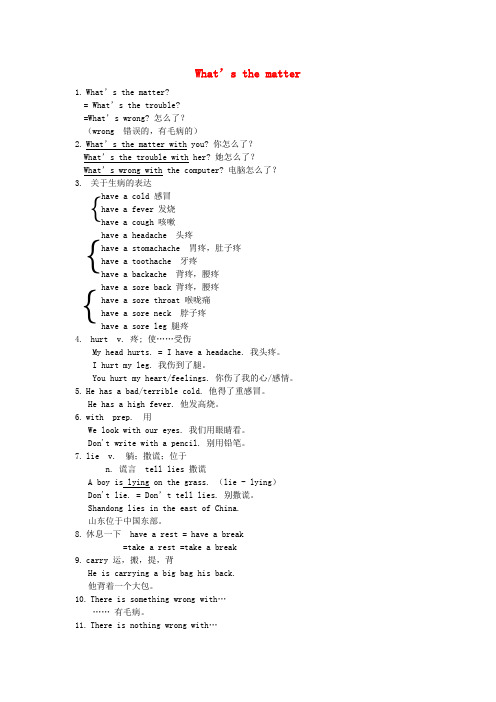
What’s the matter1.What’s the matter?= What’s the trouble?=What’s wrong? 怎么了?(wrong 错误的,有毛病的)2.What’s the matter with you? 你怎么了?What’s the trouble with her? 她怎么了?What’s wrong with the computer? 电脑怎么了?感冒发烧咳嗽头疼胃疼,肚子疼牙疼背疼,腰疼背疼,腰疼喉咙痛脖子疼腿疼疼; 使……受伤My head hurts. = I have a headache. 我头疼。
I hurt my leg. 我伤到了腿。
You hurt my heart/feelings. 你伤了我的心/感情。
5.He has a bad/terrible cold. 他得了重感冒。
He has a high fever. 他发高烧。
6.with prep. 用We look with our eyes. 我们用眼睛看。
Don't write with a pencil. 别用铅笔。
7.lie v. 躺;撒谎;位于n. 谎言 tell lies 撒谎A boy is lying on the grass. (lie - lying)Don't lie. = Don’t tell lies. 别撒谎。
Shandong lies in the east of China.山东位于中国东部。
8.休息一下 have a rest = have a break=take a rest =take a break9.carry 运,搬,提,背He is carrying a big bag his back.他背着一个大包。
10.There is something wrong with………有毛病。
11.There is nothing wrong with………没毛病。
初中英语八年级What’s the matter 词汇学习
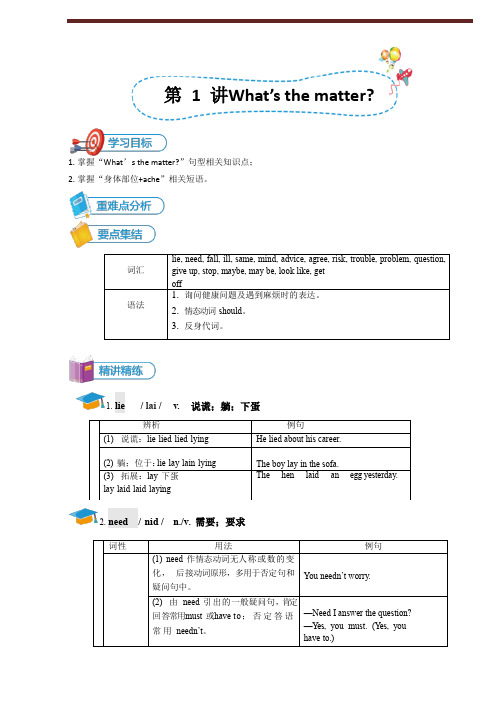
第 1 讲 What’s the matter?1. 掌握“What ’s the matter?”句型相关知识点;2. 掌握“身体部位+ache ”相关短语。
词汇 lie, need, fall, ill, same, mind, advice, agree, risk, trouble, problem, question, give up, stop, maybe, may be, look like, get off语法1. 询问健康问题及遇到麻烦时的表达。
2. 情态动词 should。
3.反身代词。
1. lie / lai / v. 说谎;躺;下蛋2. need / nid / n./v. 需要;要求辨析例句(1) 说谎:lie -lied -lied -lying He lied about his career.(2) 躺;位于:lie -lay -lain -lyin gThe boy lay in the sofa.(3) 拓展:lay 下蛋 lay -laid -laid -layingThe hen laid an egg yesterday.词性 用法例句(1) need 作情态动词无人称或数的变化, 后接动词原形,多用于否定句和疑问句中。
You needn’t worry. (2) 由 need 引出的一般疑问句,肯定回 答 常 用 must 或 have to ;否定答语常用needn’t 。
—Need I answer the question?—Y es, you must. (Y es, you have to.)3.fall/ fɔl /n./v. 下降;跌下(4.mind / maɪnd /n. /v . 理智;介意5.advice / ədˈvaɪs / n.建议;忠告6. risk / rɪsk / n./vt. 风险;冒...的危险give up/8.look like看起来像一)询问健康问题及遇到麻烦时的表达一、What ’ s the matter? 句型matter ,名词,意为“问题;事情”,用于询问他人怎么了,可互换的短语如下 :What ’s the matter(with sb)? What ’s wrong (with sb)? What ’s the trouble (with sb)?/ What ’s one ’s trouble? What happened( to sb)? Are you OK?辨析Is there anything wrong (with sb)?二、要表达身体某一部位疼痛或不舒服sb+have/has+身体部位-ache( headache/toothache…) Eg. She had a stomachache last night.sb+have/has a sore+身体部位Eg. He has a sore throat.sb+hurt(s)+身体部位或反身代词Eg. He hurt his leg.sb+have/has a pain in one’s +身体部位Eg. I have a pain in my chest.There is something wrong with one’s+身体部位Eg. There is something wrong with my right eye.拓展have a/an + 疾病名词“患……病” (cold/fever/cough) have a sore throat 患喉咙痛have a sore back患背痛have a fever 发烧have a cold =catch a cold患感冒have a stomachache 患胃痛have a toothache 患牙痛have a headache 患头痛have a backache 患背痛二)情态动词shouldShould 是情态动词,意为“应该;应当”其后接动词原形,无人称和数的变化。
Whats the matter
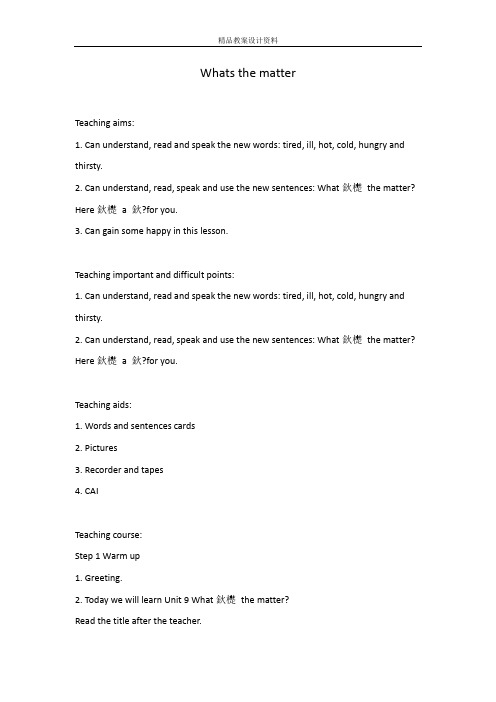
Whats the matterTeaching aims:1. Can understand, read and speak the new words: tired, ill, hot, cold, hungry and thirsty.2. Can understand, read, speak and use the new sentences: What鈥檚the matter? Here鈥檚a 鈥?for you.3. Can gain some happy in this lesson.Teaching important and difficult points:1. Can understand, read and speak the new words: tired, ill, hot, cold, hungry and thirsty.2. Can understand, read, speak and use the new sentences: What鈥檚the matter? Here鈥檚a 鈥?for you.Teaching aids:1. Words and sentences cards2. Pictures3. Recorder and tapes4. CAITeaching course:Step 1 Warm up1. Greeting.2. Today we will learn Unit 9 What鈥檚the matter?Read the title after the teacher.3. Today is the 11th of December. What holiday is coming soon?Let鈥檚enjoy a Christmas song.T: At Christmas, children are very happy. Because they can get many presents. But this girl is not happy. She sells matches. It is snowy. She sits under the window. What鈥檚the matter with the girl? Maybe she鈥檚cold. Now let鈥檚ask her. S: What鈥檚the matter?T: Oh, she鈥檚cold. We can help her. Here鈥檚a sweater (jacket, scarf) for you.Step 2 Presentation1. hotcold鐨勫弽涔夎瘝hot (not lot)2. T: The girl looks into the window. Maybe she鈥檚very hungry. Who can ask her??S: What鈥檚the matter? hungry锛?T: Let鈥檚help her. Here鈥檚a hamburger ( a cake, some bread) for you.3. Show a picture.T: What鈥檚the matter with the boy?S: He鈥檚thirsty.thirsty ( thirty )4. Practice ( cold hungry)A: What鈥檚the matter?B: I鈥檓...A: Here鈥檚鈥?for you.B: Thank you.5. T: What鈥檚the matter with Tom? He鈥檚tired. tired缁曞彛浠ゆ父鎴?T: What鈥檚the matter with Jack? He鈥檚ill. ill.6. Read the words one by one.Step 3 Consolidation1. T: I鈥檒l give you 2 minutes to remember these words. Play a game: What鈥檚missing?tired thirsty ill2. Let鈥檚chant.3. Work in pairs (Part C).Give an exampleWork in pairs and check the answers.4. Do exercise.Step 4 Homework1. Read and copy the new words.2. Make a dialogue with you friends.。
4B unit7 What’s the matter知识点(译林版)

4B unit7 What’s the matter知识点(译林版)本资料为woRD文档,请点击下载地址下载全文下载地址译林4Bunit7what’sthematter?知识点一、复习比拼、来吃个派comeandhaveapie(翻译时注意动词是几个)去打乒乓球____and_____the_____________.去画一些图片______and_______some_________.来看一看comeand________________.2、饥饿的:口渴的:疲惫的:生病的:伤心的:反:以上词都是(),所以在此类词前面要加上()。
例如:我不饿:我口渴:你生病了:我很累:3、我能喝些水吗?canI___________water?(一般疑问句中some要改为______,这里也是一样吗?为什么?你还能就哪些例子,写在下面)4、怎么了?what’sthematter?=what’s_______?你怎么了?5、我想睡觉Iwanttogotobed.想做...事情wanttodo...想要...东西want+名词想去看电视:想要一个苹果派:6、给你Hereyouare.7、这有一些水Here’ssomewater.=Hereissomewater.(不可数名词如水、果汁等前面用___)例如:这有一些果汁:这有一面扇子Here’sa_____.这有一个热狗Here’sahotdog.8、以一种不同的方式:inadifferentway(反)以相同的方式:9、我是狐狸夫人(电话用语):Thisism___Fox___________.(跟别人打电话的时候是现在正在讲话,所以时态要用现在进行时)例如,你跟别人打电话时,你怎样介绍你自己:0、你还好吗?Areyouallright?Allright:1、吃个蛋糕haveacake.=eatacake喝一些水_____somewaterHave有吃、喝的意思2、他现在高兴了He’shappynow.*some在疑问句中的用法:在一般疑问句中,some要改为any,但是在有些情况中,some却没有改变,这是为什么呢?表示请求的疑问句canIhavesomeorangejuice,please?我能喝些果汁吗?mayIaskyousomequestions?我可以问你一些问题吗?表示建议的疑问句Shallwehavesomepiesforrice?我们晚饭吃些馅饼好吗?Howaboutsomenoodles?来些面条怎么样?表示反问的疑问句can’tyouseesomegrassoverthere?你难道看不见那边的草吗?④表示说话希望得到肯定回答的疑问句canyouseesomebirdsinthetree?你能看见树上有些鸟吗?二、音标、读一读:gohomenoseclosenoopen2、想一想:gohomenoseclosenoopen3、学一学:音标档案姓名:【əu】性别:双元音战斗策略:字母o战斗秘诀:有[ə]和[u]两个单音组成,口形由半开到小,字母o就发这个音难度系数:★★相同音标的其他单词:翻开单词表总结Howdotheygothere?It’stentoseveninthemorning,myfriendsandIareonourwaytos chool.ThegirlwithaschoolbagonherbackisLinda.Shelike sclimbing.ThegirlwearingaskirtisEllen.Shewalkstosch ooleveryday.Peteristheoneonthebus.He’swithmenow.He’swearingacap.Look!who’sintheplane?That’smymother,mrsGreen.She’sgoingtoBeijing.“chinaisgreat!”sheoftentellsme.myteacher,mrwhiteisonthetrainnow.Hi shomeisfarfromourschool.where’smysisterkate?She’sinthecar.“It’sfastandsafe.”Shesays.mynameisjim.whereamI?.whattimeisit?_________________________________ ___________________________2.whoisLinda?______________________________________ _______________________3.where’sjim’smother?___________________________________________ ___________4.Ismrwhite’shomenearjim’sschool?_________________________________________。
unit1what's the matter单元知识总结
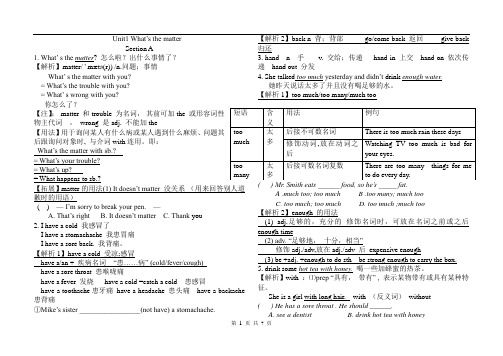
Unit1 What’s the matterSection A1. What’ s the matter? 怎么啦?出什么事情了?【解析】matter/ ' mætə(r)) /n.问题;事情What’ s the matter with you?= What’s the trouble with you?= What’ s wrong with you?你怎么了?【注】:matter 和trouble 为名词,其前可加the 或形容词性物主代词,wrong 是adj. 不能加the【用法】用于询问某人有什么病或某人遇到什么麻烦、问题其后跟询问对象时, 与介词with连用。
即:What’s the matter with sb.?= What’s your trouble?= What’s up?= What happens to sb.?【拓展】matter的用法(1) It doesn’t matter 没关系(用来回答别人道歉时的用语)( ) —I’m sorry to break your pen. —_______A. That’s rightB. It doesn’t matterC. Thank you2. I have a cold 我感冒了I have a stomachache 我患胃痛I have a sore back. 我背痛。
【解析1】have a cold 受凉;感冒have a/an + 疾病名词“患……病” (cold/fever/cough)have a sore throat 患喉咙痛have a fever 发烧have a cold =catch a cold 患感冒have a toothache患牙痛have a headache 患头痛have a backache 患背痛①Mike’s sister _________________(not have) a stomachache.【解析2】back n 背;背部go/come back 返回give back 归还3.hand n 手v. 交给;传递hand in 上交hand on 依次传递hand out 分发4. She talked too much yesterday and didn’t drink enough water.她昨天说话太多了并且没有喝足够的水。
Unit 1 What’s the matter? 课文讲解 知识点 练习
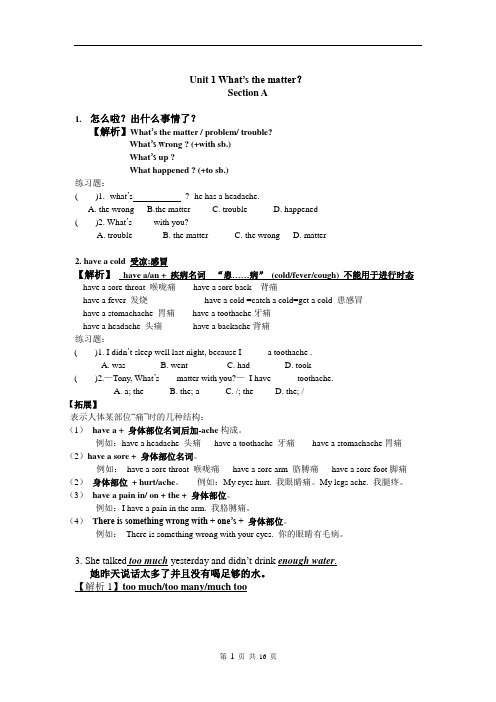
Unit 1 What’s the matter?Section A1.怎么啦?出什么事情了?【解析】What’s the matter / problem/ trouble?What’s w rong ? (+with sb.)What’s up ?What happened ? (+to sb.)练习题:( )1. -what’s ?- he has a headache.A. the wrongB.the matterC. troubleD. happened( )2. What’s ____ with you?A. troubleB. the matterC. the wrongD. matter2. have a cold 受凉;感冒【解析】have a/an + 疾病名词“患……病”(cold/fever/cough) 不能用于进行时态have a sore throat 喉咙痛have a sore back 背痛have a fever 发烧have a cold =catch a cold=get a cold 患感冒have a stomachache 胃痛have a toothache牙痛have a headache 头痛have a backache背痛练习题:( )1. I didn’t sleep well last night, because I _____ a toothache .A. wasB. wentC. hadD. took( )2.—Tony, What’s ___ matter with you?—I have _____ toothache.A. a; theB. the; aC. /; theD. the; /【拓展】表示人体某部位“痛”时的几种结构:(1)have a + 身体部位名词后加-ache构成。
例如:have a headache 头痛have a toothache 牙痛have a stomachache胃痛(2)have a sore + 身体部位名词。
Unit 1 What's the matter?

Unit1What's the matter?本单元单词:matter[ˈmætə(r)]n.问题;事情What's the matter?怎么了?出什么事了?sore[sɔ:(r)]adj.疼痛的;伤痛的have a cold感冒stomachache['stʌməkeɪk]n.胃痛;腹痛have a stomachache胃痛foot[fʊt]n.脚;足neck[nek]n.颈;脖子stomach[ˈstʌmək]n.胃;腹部throat[θrəʊt]n.咽喉;喉咙fever[ˈfi:və(r)]n.发烧lie[laɪ](lay[leɪ])v.躺;平躺lie down躺下rest[rest]v.&n.放松;休息cough[kɒf]n.&v.咳嗽X-ray[ˈeks reɪ]n.X射线;X光toothache[ˈtu:θeɪk]n.牙痛take one's tempreture量体温have a fever发烧break[breɪk]n.间歇;休息take breaks(take a break)休息hurt[hɜ:t](hurt[hɜ:t])使疼痛;受伤passenger[ˈpæsɪndʒə(r)]n.乘客;旅客off[ɒf]adv.&prep.离开(某处);不工作;从…去掉get off下车onto[ˈɒntu]prep.向;朝trouble[ˈtrʌbln.问题;苦恼hit[hɪt](hit[hɪt])(用手或器具)击;打right away立即;马上get into陷入;参与herself[hɜ:ˈself]pron.(she的反身代词)她自己bandage[ˈbændɪdʒ]n.绷带v.用绷带包扎press[pres]v.压;挤;按sick[sɪk]adj.生病的;有病的knee[ni:]n.膝盖;膝nosebleed[ˈnəʊzbli:d]n.鼻出血breathe[bri:ð]v.呼吸sunburned[ˈsʌnbɜ:nd]adj.晒伤的ourselves[,aʊəˈselvz]pron.(we的反身代词)我们自己climber[ˈklaɪmə(r)]n.登山者;攀登者be used to习惯于…;适应于…risk[rɪsk]n.&v.危险;风险;冒险take risks(take a risk)冒险accident[ˈæksɪdənt]n.交通事故kilo[ˈki:ləʊ](=kilogram)n.千克;公斤rock[rɒk]n.岩石run out of用尽;耗尽knife[naɪf]n.(pl.knives[naɪvz])刀cut off切除blood[blʌd]n.血mean[mi:n](meant[ment])v.意思是;打算;意欲get out of离开;从…出来importance[ɪmˈpɔ:tns]n.重要性;重要decision[dɪˈsɪʒn]n.抉择;决定control[kənˈtrəʊl]n.&v.限制;约素;管理be in control of掌管;管理spirit[ˈspɪrɪt]n.勇气;意志death[deθ]n.死亡give up放弃nurse[nɜ:s]n.护士Judy['dʒu:di]朱迪(女名)Nancy[ˈnænsi]南希(女名)Mandy['mændɪ]曼迪(女名)Aron['erən]Ralston['rɔ:lstən]阿伦·罗尔斯顿Utah['ju:ta:]犹他州(美国)重点单词详解:1.matter n.问题;事情短语:what's the matter常用于询问某人患了何种疾病,遇到了什么困难、烦恼或周边出了什么状况等该句型也可用于询问某物出了什么故障,其后可接with sb./sth.表示“某人/某物怎么了?”。
Unit1what’sthematter_SectionA知识点梳理人教版八年级英语下册

人教版八年级下册英语课本知识点梳理Unit 1 wh at’s the matter? sectionA课文内容:What's the matter? 怎么了? (教材第1页)【用法详解】What's the matter? 怎么了?/出什么事了?常用于询问某人患了何种疾病,遇到了什么困难等,也可用于询问某物出了什么故障,其后可接with sb./sth.,表示“某人/某物怎么了?”。
其中matter 用作名词,意为“问题;事情”matter前须加定冠词the。
【例句】What's the matter? 怎么了?Bad luck.I lost my pen. 真倒霉,我弄丢了钢笔.What's the matter with him? 他怎么了?He has a sore back.他背痛【拓展】matter[动词] 要紧;有关系多用在否定句、疑问句或条件句中It doesn't matter.没关系。
(通常用来回答对方的道歉)I have a cold. 我感冒了。
(教材第1页)【用法详解】have a cold (患)感冒。
其中have 用作及物动词,意为“患(病);遭受(病痛)”,常用于结构“have a/an +疾病名称”表示患病或身体某部位不舒服。
此时它不能用于进行时态,其第三人称单数形式为has,过去式为had。
常见的表示病痛的短语还有:have a fever 发烧have a toothache 牙疼have a headache头痛have a cough 咳嗽have a stomachache胃痛Do you often have a cold? 你经常感冒吗?Jim had a stomachache after supper yesterday.吉姆昨天晚饭后胃痛。
l have a stomachache.我胃痛。
( 教材第1 页)【用法详解】stomachache [名词]胃痛;腹痛是由“名词stomach(;腹部)+ache(疼痛)”构成的复合名词。
what's the matter的用法?
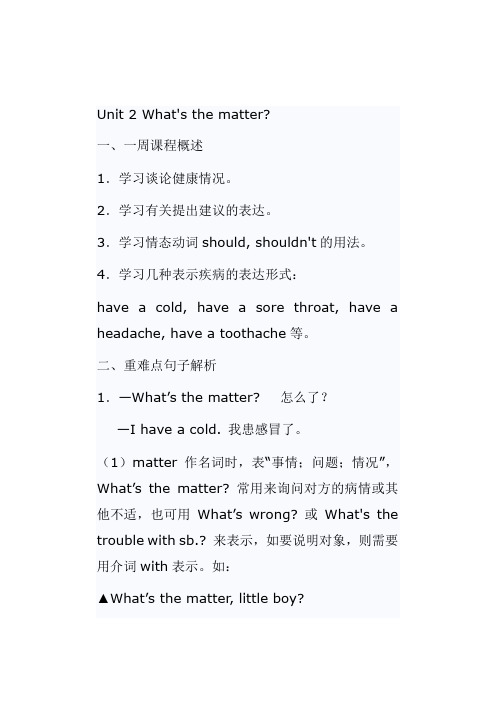
Unit 2 What's the matter?一、一周课程概述1.学习谈论健康情况。
2.学习有关提出建议的表达。
3.学习情态动词should, shouldn't的用法。
4.学习几种表示疾病的表达形式:have a cold, have a sore throat, have a headache, have a toothache等。
二、重难点句子解析1.—What’s the matter? 怎么了?—I have a cold. 我患感冒了。
(1)matter作名词时,表“事情;问题;情况”,What’s the matter? 常用来询问对方的病情或其他不适,也可用What’s wrong? 或What's the trouble with sb.? 来表示,如要说明对象,则需要用介词with表示。
如:▲What’s the matter, little boy?小男孩,你有什么事?▲What’s wrong / the matter with her? 她怎么了?※wrong是形容词,前面没有“the”; matter和trouble都是名词,前面应有“the”,trouble前还可以用形容词性的物主代词。
▲What's your trouble, young man?年轻人,你怎么了?2.I have a sore throat. 我喉咙痛。
(1)have vt.患(得)病,(不用于进行时态)▲He had a bad cold last week.他上周患了重感冒。
▲She often has a stomachache. 她常胃(肚子)疼。
※一般情况下用have+a+n.(病名)表示“患了某种疾病”。
have a cold 感冒have a sore back 背痛have a stomachache 胃痛have a sore throat 嗓子痛have a toothache 牙痛have a headache 头痛have a fever发烧have a backache 背痛注意a在此不表示数量“一”,而是不定冠词加名词表示一类事物。
新译林英语4B unit7 What’s the matter讲义及练习
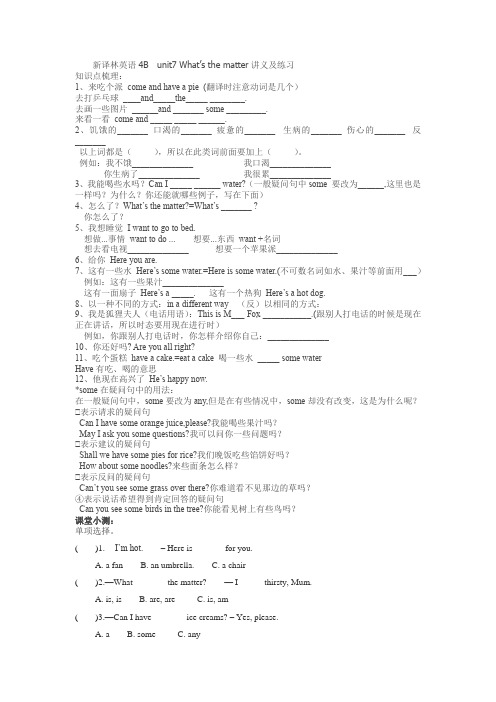
新译林英语4B unit7 What’s the matter讲义及练习知识点梳理:1、来吃个派 come and have a pie (翻译时注意动词是几个)去打乒乓球 ____and_____the_____ ________.去画一些图片 ______and _______ some _________.来看一看come and _____ _____ ______.2、饥饿的_______ 口渴的_______ 疲惫的_______ 生病的_______ 伤心的_______ 反_______以上词都是(),所以在此类词前面要加上()。
例如:我不饿______________ 我口渴______________你生病了______________ 我很累______________3、我能喝些水吗?Can I _____ ______ water?(一般疑问句中some 要改为______,这里也是一样吗?为什么?你还能就哪些例子,写在下面)4、怎么了?What’s the matter?=What’s _______ ?你怎么了?5、我想睡觉I want to go to bed.想做...事情want to do ... 想要...东西want +名词想去看电视______________ 想要一个苹果派______________6、给你 Here you are.7、这有一些水Here’s some water.=Here is some water.(不可数名词如水、果汁等前面用___)例如:这有一些果汁______________这有一面扇子Here’s a _____.这有一个热狗Here’s a hot dog.8、以一种不同的方式:in a different way (反)以相同的方式:9、我是狐狸夫人(电话用语):This is M___ Fox ___________.(跟别人打电话的时候是现在正在讲话,所以时态要用现在进行时)例如,你跟别人打电话时,你怎样介绍你自己:______________10、你还好吗? Are you all right?11、吃个蛋糕have a cake.=eat a cake 喝一些水_____ some waterHave有吃、喝的意思12、他现在高兴了He’s happy now.*some在疑问句中的用法:在一般疑问句中,some要改为any,但是在有些情况中,some却没有改变,这是为什么呢? 表示请求的疑问句Can I have some orange juice,please?我能喝些果汁吗?May I ask you some questions?我可以问你一些问题吗?表示建议的疑问句Shall we have some pies for rice?我们晚饭吃些馅饼好吗?How about some noodles?来些面条怎么样?表示反问的疑问句Can’t you see some grass over there?你难道看不见那边的草吗?④表示说话希望得到肯定回答的疑问句Can you see some birds in the tree?你能看见树上有些鸟吗?课堂小测:单项选择。
whatsthematter的同义句

whatsthematter的同义句“What's the matter”是一种常见的短语,用于询问某人身体状况、感受或遇到的问题等。
然而,作为一名具有扩展词汇量的英语学习者,我们需要掌握更多的同义词汇,以丰富我们的表达能力。
下面,本文将从简单到复杂,逐步展开同义短语的介绍。
一、“What's wrong?”这是最常见的同义短语之一,意思与“What's the matter”非常类似,可以用来询问某人的情况,尤其在口语中使用广泛。
例如,“What's wrong with you? You look upset.”二、“What happened?”这个短语通常用于询问某人发生了什么事情,尤其是不愉快的事情。
例如,“You left the party early. What happened?”三、“What's going on?”这个短语通常用于寻求关于某种情况或活动的信息,或者询问某人的感受。
例如,“What's going on at the meeting?” “What'sgoing on with you? You seem distracted.”四、“What's the trouble?”这个短语带有一种关切的语气,通常用于询问某人是否遇到了问题或困难。
例如,“What's the trouble with your car? Do you need a ride?”五、“Are you alright?”这个短语也是关切的表达方式,特别是用于询问某人是否身体上或情绪上感觉良好。
例如,“Are you alright? You look pale.”六、“What's the issue?”这个短语通常用于商业或法律领域的讨论,以指代某种争议或争论。
例如,“What's the issue in the contract negotiation?”七、“What's amiss?”这个短语表示某事物没有按照预期的那样运作,有一些不对劲的地方,通常用于探究故障或问题的根源。
八年级下册英语Unit1 what is the matter?

Conversation 3
Girl: Boy:
YI othuinlokoIkatteerrtoibolem!自Wuchh助aat'tsd的thinenmeraltatesrt?
night. It was an all-you-can-eat meal
at the restaurant. But now I have a
Unit 1
What’s the matter
SECTION A
New words
• 1. matter
常用于句型:
What's the matter?
怎么了? 出什么事了?
It doesn't matter. 没关系
Watch and say the illness. have a sore throat
Girl 2: Oh, thanks.
2d Role-play the conversation
Mandy: Lisa, are you OK? Lisa: I have a headache and I can't move my neck. What should I
do? Should I take my temperature? Mandy: No, it doesn't sound like you have a fever. What did you
What should I do? Girl 1: Maybe you have a fever. You
should take your temperature. Girl 2: Yes, you're right.
Conversation 2
- 1、下载文档前请自行甄别文档内容的完整性,平台不提供额外的编辑、内容补充、找答案等附加服务。
- 2、"仅部分预览"的文档,不可在线预览部分如存在完整性等问题,可反馈申请退款(可完整预览的文档不适用该条件!)。
- 3、如文档侵犯您的权益,请联系客服反馈,我们会尽快为您处理(人工客服工作时间:9:00-18:30)。
A: What’s the matter with you?
B: I have a toothache.
What should he do? 1. toothache a. lie down and rest
2. sore throat
3. stomachache
Conversation 3 Girl: What’s the matter? Boy: I have a stomachache.
Girl: That’s too bad. You should lie
down and rest. And don’t eat
anything for two hours.
ache n.(持续而隐约的)疼痛 head back tooth ear stomach headache backache toothache earache stomachache
一般情况下用have+a+n 表示患了 某种疾病。
have vt. 患(得)病
“have+a+疾病名”表示“患……病
a d
c l j
g b h
i f e
m
1b Listening
Nancy__ Sarah__ Ben__ Judy__
David__
Ben Judy
Sarah
Nancy
David
Tapescript
Conversation 1 Nurse: What’s the matter, Sarah? Girl: I have a cold. Conversation 2 Nurse: What’s the matter, David? Boy: I have a stomachache.
Let’s act.
I have a cold. What’s the matter? When did it start? You should…
headache
Exercises
1. I hope _________________. A. you feel better soon. B. you to be better soon. C. you’ll be better soon D. A and B.
Conversation 3 Nurse: What’s the matter, Ben? Boy: I have a sore back. Conversation 4 Nurse: What’s the matter, Nancy? Girl: I have a toothache. Conversation 5 Nurse: What’s the matter, Judy? Girl: I have a sore throat.
b. hot tea with honey
c. see a dentist
4. fever
d. drink lots of water
2b
toothache
hot tea with honey
see a dentist
stomachache
lie down and rest
fever
drink lots of water
3. You should drink some hot water. 你应该喝点热水。 should情态动词“应该”,shouldn’t ―不应该”, 其后接动词原形, 没有人称 和数的变化, 用于提出建议。
You should be more careful next time. 你下次应更加小心。 She shouldn’t go to the party.
2.--What’s the matter ____ you, Lucy? --Nothing much. A. on B with C. to D. of
3. --- __________________? --- I have a sore back. A. What’s the matter? B. What’s wrong with you ? C. Do you have a sore back? D. either A or B
Unit 5 What’s the matter?
head
arm
neck back hand leg Knee/ni / foot
hair eyes face ear
Tongue
Throat
/tʌŋ /舌 头
/θrot/
What’s the matter?
What’s the matter with you ?
4. I'm not feeling well.=I don't feel well.
我觉得不舒服。
feel v. (自己) 感觉到……,(心情)觉
得……,+形容词 I feel hungry/sick. 我觉得饿 (不舒服)。
The good words made her feel good. 那些好话使她觉得心里很舒服。 I hope you feel better soon. 我希望你能马上感觉好点。 better 是well的比较级。
注释
-ache 和 sore 疼痛 -ache 是一个后缀,常指持续性的 疼痛,它常与身体部位的名词构成 复合词,如:toothache , headache , stomachache . sore 是一个独立的单词,指的是身 体某一部位的酸痛,在表示身体的某 部位疼痛时,常置于部位名词前。 如:sore back, sore throat.
What’s wrong with you ?
你怎么啦?
What’s your trouble?
What happened to you?
What’s the matter? I’m ill.
toothache
headache
stomachache
sore back
cold
fever
sore neck
她不应该去参加晚会。
※用来表示建议还可能用以下句型:
Let’s go to play soccer.
我们去踢足球吧。
2. I have a sore throat. 我喉咙痛。
(1)have vt. 患(得)病,(不用于 进行时态)
He had a bad cold last week.
他上周患了重感冒。
You should drink lots I have a fever. of water.
Tapescript
Conversation 1
Girl 1: What’s the matter?
Girl 2: I have a fever. Girl 1: Yes, you don’t look well. You should drink lots of water. Girl 2: Yes, you’re right.
1.What's the matter? 你哪里不舒服?(你怎么了?) matter n.问题,麻烦,事件,通常 与介词“with‖连用。 What's the matter with him? 他怎么了?
这个句型可以与下面这两个句子互换: What's wrong with him? What's the trouble with him? wrong是形容词, 前面没有“the‖; matter和trouble都是名词, 前面应有 “the‖, trouble前还可以用形容词性的物 主代词。 What’s your trouble, young man? 年轻人, 你怎么了?
5. Do you have a cold?
你感冒了吗?
cold在这里是名词,意为“感冒”。 患感冒:have a cold, catch (a) cold, get a cold.
cold还可用作形容词, 意为“冷的, 寒 冷的”。 It's so cold today that I have a cold. 今天太冷了, 我都感冒了。 ※第一个cold是形容词,第二个cold是 名词。
Pairwork
A: What’s the matter with him/her? B: He/She has a...
1.—What is wrong with you ? —My back is very ______. A. sore B. hurts C. hurting D. pain
4. Billy have a _____ fever, so he don’t go to school today. A. tall B. big C. high D. height
5. – _______does he take this medicine ? -- Twice a day. A. How soon C. How much B. How long D. How often
Conversation 2 Girl 1: What’s the matter? Girl 2: I have a sore throat. Girl 1: You should drink some hot tea with honey. Girl 2: That sounds like a good idea.
患感冒
胃痛 牙痛
发烧 背疼 头疼 咽喉痛
have a cold have a stomachache have a toothache have a fever have a backache have a headache have a sore throat
What’s the matter?
I have a cold.
